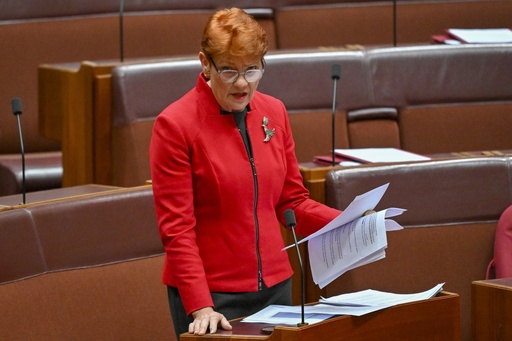
MELBOURNE, Australia — A ruling from an Australian judge on Friday stated that Sen. Pauline Hanson, leader of the anti-immigration party, violated racial discrimination laws by offensively instructing Sen. Mehreen Faruqi, who was born in Pakistan, to return to her homeland.
Faruqi took legal action against Hanson in the Federal Court following a controversial 2022 exchange on social media platform X, previously known as Twitter. She claimed Hanson’s remarks contravened the Racial Discrimination Act, which prohibits public statements and actions that could offend, insult, humiliate, or intimidate individuals based on race, color, or national or ethnic background.
The incident stemmed from Faruqi, deputy leader of the Australian Greens, reacting to the news of Queen Elizabeth II’s passing by expressing her inability to mourn a leader representing a racist empire built on the subjugation and exploitation of colonized peoples. In response, the 70-year-old Hanson made derogatory comments about Faruqi’s immigration to Australia, suggesting she had come merely to exploit the country, along with a vulgar demand for her to return to Pakistan.
Hanson’s reputation for controversial opinions on race became apparent when she first entered Parliament in 1996, famously declaring that Australia risked being “swamped by Asians” due to its immigration policies. Furthermore, she gained attention when she donned a burqa in the Senate to advocate for a ban on Islamic face coverings.
Faruqi, now 61 and a qualified engineer, emigrated to Australia with her husband back in 1992 as skilled migrants. In the court’s findings, Justice Angus Stewart deemed Hanson’s behavior as “seriously offensive” and threatening while labeling the social media post as racist, nativist, and anti-Muslim, declaring it a “strong form of racism.” As a result, he ordered Hanson to delete her offensive post and cover Faruqi’s legal expenses, which he anticipated would be quite substantial.
Faruqi greeted the verdict as a triumph for “every individual who has faced the demeaning command to return to their origins.” She expressed that too many people have endured such blatant racism throughout Australia, affirming that the ruling reinforces the notion that telling someone to return to their homeland is indeed a severe form of racism. She declared, “Today is a positive day for people of color, for Muslims, and for all who are dedicated to cultivating an anti-racist society.”
In contrast, Hanson expressed her disappointment, announcing plans to appeal the decision. She criticized the ruling for demonstrating an excessively broad interpretation of the Racial Discrimination Act, arguing it adversely impacted political expression. Hanson’s legal team contended that her remarks fell under the shield of constitutionally protected political communication.
She maintained that the queen’s death was a pertinent public issue, as were the opinions expressed by Faruqi. However, Justice Stewart noted that Hanson’s post did not directly address any points raised in Faruqi’s original comments. In his judgment, he remarked that Hanson’s tweet represented an “angry ad hominem attack” lacking substance or relevant commentary regarding Faruqi’s statement.
Stewart found Hanson’s testimony to be generally unreliable, dismissing her claim that she was unaware of Faruqi’s religious beliefs at the time of her post. Although Hanson acknowledged advocating for a ban on Muslim immigration previously, she clarified that it was a personal perspective rather than a formal policy of her party. She did confess to previously stating in an interview that she would refuse to sell her house to a Muslim, though she hesitated to clarify whether that statement reflected her true feelings.
Australia continues to evolve into a multicultural environment, as indicated by the latest census in 2021, which revealed that individuals born overseas or with at least one foreign-born parent now constitute a majority within the nation.
